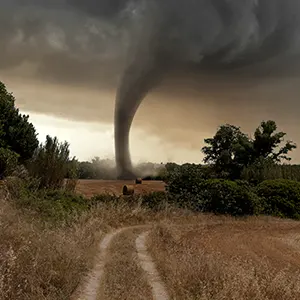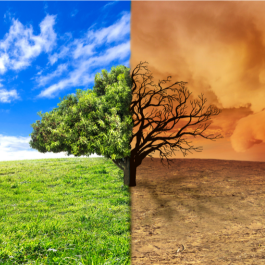Aprender vocabulario te permitirá expresar tus opiniones, experiencias o sentimientos al respecto. Además, podrás ampliar tu cultura general y tu curiosidad por el mundo que nos rodea.
Te presentamos una lista de algunos de los fenómenos naturales más importantes:
- Earthquake (terremoto): A sudden, violent movement of the earth’s surface, often causing damage and deaths. Example: The earthquake in Chile was very strong and scary.
- Tsunami (maremoto): An ocean wave, very large and dangerous, caused by an earthquake under the sea. Example: The tsunami hit the coast and destroyed many houses and buildings.
- Forest fire (incendio forestal): A fire burning in an area with many trees and difficult to control. Example: The forest fire was caused by a lightning strike.
- Hurricane (huracán): A violent storm with strong circular winds. Example: The hurricane was named Katrina and it devastated New Orleans.
- Snowstorm (tormenta de nieve): A storm that brings a lot of snow and usually strong winds. Example: The snowstorm made the roads impassable and the schools closed.
- Flood (inundación): An overflow of water that covers land that is usually dry. Example: The flood was caused by the heavy rain and the river overflowed.
- Drought (sequía): A long period of time when there is little or no rain. Example: The drought affected the crops and the farmers had a hard time.
- Famine (escasez): A severe shortage of food that causes hunger and malnutrition. Example: The famine was a result of the war and the drought.
- Blizzard (ventisca): A severe snowstorm with strong winds and low visibility. Example: The blizzard made it impossible to see anything and the temperature dropped below zero.
- Squall (borrasca): A sudden, violent gust of wind, often accompanied by rain, snow, or hail. Example: The squall surprised the sailors and they had to lower the sails.
- Storm (tormenta): A violent disturbance of the atmosphere with strong winds and usually rain, thunder, lightning, or snow. Example: The storm was very loud and the thunder scared the children.
- Hail (granizo): Small balls of ice that fall from the sky like rain. Example: The hail damaged the cars and the windows.
- Mudslide (alud): A mass of mud and rock that slides down a slope. Example: The mudslide buried the village and many people died.
- Avalanche (avalancha): A mass of snow, ice, and rock that falls down a mountain. Example: The avalanche trapped the skiers and they had to be rescued.
- Volcanic eruption (erupción volcánica): The sudden release of lava, ash, and gas from a volcano. Example: The volcanic eruption was spectacular and the lava flowed into the sea.
- Typhoon (tifón): A tropical storm in the region of the Indian or western Pacific oceans. Example: The typhoon was very powerful and it caused a lot of damage in the Philippines.
- Monsoon (monzón): A seasonal prevailing wind in the region of South and Southeast Asia, bringing rain or dry weather. Example: The monsoon season is from June to September and it brings a lot of rain.
- Tornado (tornado): A rapidly rotating column of air that is in contact with both the surface of the earth and a cumulonimbus cloud. Example: The tornado was very fast and it lifted the cars and the houses.
- Cyclone (ciclón): A system of winds rotating inward to an area of low atmospheric pressure. Example: The cyclone was very destructive and it killed many people in India.
Hay muchos fenómenos naturales, te animamos a que practiques el vocabulario con ejercicios, juegos, canciones o vídeos. También puedes buscar más información sobre estos fenómenos naturales en inglés y ampliar tus conocimientos. ¡Ah! Y no olvides venir a vivir la mejor experiencia con KOE, el mejor curso de inglés. Con el método Fast & Easy y la fórmula perfecta, hablar inglés será muy sencillo.








